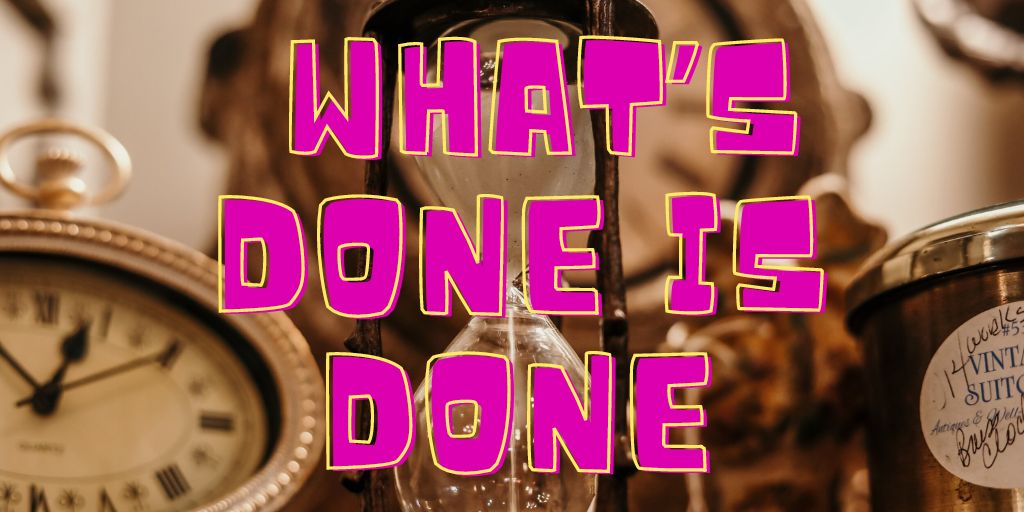The idiom “what’s done is done” is used to express the idea that something that has already happened cannot be changed. It is a reminder that we cannot go back in time and undo our actions, so we should learn from our mistakes and move on.
The expression can be used in a variety of contexts, such as when someone makes a mistake, when someone experiences a loss, or when someone simply wants to accept the reality of a situation. For example, if you accidentally break a vase, you might say “What’s done is done” to remind yourself that there is no point in dwelling on the past. Or, if you lose a loved one, you might say “What’s done is done” to acknowledge that the person is gone and that you need to find a way to move on with your life.
The idiom “what’s done is done” can also be used in a more positive sense. For example, if you achieve a goal, you might say “What’s done is done” to celebrate your accomplishment and to focus on the future. Or, if you make a difficult decision, you might say “What’s done is done” to signal that you are committed to your decision and that you are not going to second-guess yourself.
The Origin of “What’s Done Is Done”
The origin of the idiom “what’s done is done” is not entirely clear. However, there are a few possible explanations.
One possibility is that the phrase comes from the legal principle of res judicata, which means “a matter decided.” This principle holds that a court’s decision is final and cannot be appealed. In other words, what’s done is done.
Another possibility is that the phrase comes from the religious belief that God’s will cannot be changed. This belief is expressed in the Bible in the book of Ecclesiastes, which says:
“Whatsoever God doeth, it shall be for ever: nothing can be put to it, nor any thing taken from it: and God doeth it, that men should fear before him.”
The earliest recorded use of the phrase is in the poem “The Parlement of Foules” by Geoffrey Chaucer, which was written in 1382. In the poem, Chaucer uses the phrase to describe the impossibility of changing the past:

What’s done is done
“What’s Done Is Done” in Shakespeare
The idiom “what’s done is done” appears in several of Shakespeare’s plays. One of the most famous examples is in Macbeth, where Lady Macbeth says the phrase to her husband after they have murdered King Duncan. “Things without all remedy Should be without regard: what’s done, is done.”
In this line, Lady Macbeth is trying to convince her husband, Macbeth, that he cannot change the fact that he has murdered King Duncan. She is telling him that he needs to accept his actions and move on.
In this context, the phrase means that there is no point in trying to undo what they have done. The murder has already happened, and there is no way to change that.
Other Uses of the Idiom “What’s Done Is Done”
The idiom “what’s done is done” is used in a variety of contexts, both in everyday speech and in literature.
For example, the phrase might be used to express resignation or acceptance of a situation, such as a job loss or a divorce. It might also be used to discourage dwelling on the past, such as when someone is trying to move on from a mistake they made.
The phrase can also be used in a more literal sense, to mean that something that has already happened cannot be changed. For example, if you drop a glass and it shatters, you might say “what’s done is done” to acknowledge that the glass cannot be repaired.
The idiom “what’s done is done” is also used in other languages, such as French, Spanish, and German. In French, the phrase is “Ce qui est fait est fait.” In Spanish, it is “Lo hecho, hecho está.” And in German, it is “Was getan ist, ist getan.”
The idiom is also used in a variety of other contexts, such as in legal settings, in business, and in everyday conversation. For example, a judge might say “What’s done is done” to dismiss a case that has already been decided. Or, a businessperson might say “What’s done is done” to signal that a deal is final and cannot be changed.
Conclusion
The idiom “what’s done is done” is a reminder that we cannot change the past. It is a call to accept our mistakes and move on with our lives. The phrase is a simple one, but it is a powerful one. It can help us to learn from our mistakes, to forgive ourselves, and to find peace.




Leave a Reply
Want to join the discussion?Feel free to contribute!